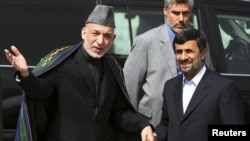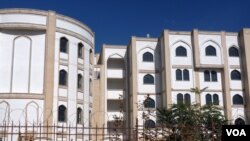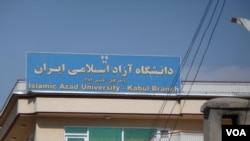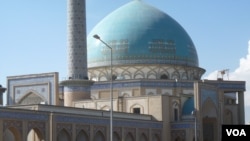ISLAMABAD —
As the United States negotiates the scope of its presence in Afghanistan after combat forces leave in 2014, Afghan former officials and analysts are getting concerned that neighboring Iran is also seeking to shape Afghanistan's future.
In the eyes of Ahmad Saeedi, a political analyst and former diplomat, Tehran’s influence is becoming pronounced.
"Afghanistan is under the siege of Iranian influence. Nowadays we have six pro-Iranian TV channels, 21 radio stations, and a large number of publications that appear in Kabul that are pro-Iranian," he says, adding, "The cultural war is more important than war led by guns."
Countering Western influence
Khalid Mafton, a U.S. educated political analyst living in Kabul, says Iran's strategy is aimed at both bolstering its support among Afghanistan's minority Shi'ites and countering U.S. and Western influence in Afghanistan.
He says that Iran's long term agenda "is to have some people who support the Iranian regime and culture in the society, and in the short and medium term is to somehow hurt the American military forces in Afghanistan."
This warning has particular resonance for Washington given its experience in Iraq, where pro-Iranian Shi'ites came to power following the U.S. military intervention.
Regional ambitions
In some ways, the relationship between Afghanistan and Iran is natural. More than a million Afghans sought refuge from the war in Afghanistan in Iran, and they are now drifting back after living there for years. And, some are bringing Iranian culture and religious beliefs with them.
Afghanistan also shares a long border with Iran and is heavily reliant on it for fuel imports, which either transit Iran or come directly over the border. And the two countries have a fair amount of trade, with Iranian exports to Afghanistan totaling some $2 billion a year.
But Davood Moradian, former chief adviser to President Hamid Karzai's foreign minister, says there are three facets to Iran's objectives in Afghanistan. There is the Iran "which has legitimate interests, Iran which has an ideological preference, and Iran which has regional ambition. And two of the three are causing problems in Afghanistan."
Analysts also believe that Iran's intelligence services - as well as Pakistan's intelligence services - are active in Afghanistan. Jawed Kohistani, a former Afghan military officer and intelligence official, says the security pact currently under negotiation between Kabul and Washington should address relations with Iran, as well as with Pakistan.
The religious factor
There are also concerns that Iran's ideological ambitions will create friction between Afghanistan's majority Sunni and minority Shia, and has sparked a tussle for influence from Iran's ideological rival, Saudi Arabia.
In western Kabul, one physical example of Iran’s influence is the Khatam al-Nabeyeen Islamic University. The complex, which also includes a madrassah and student housing, is funded with the help of Iran and teaches Iran's version of Islam.
Saudi Arabia is reportedly ready to fund the building of a large $100 million mosque and school complex in Kabul, where the Saudi brand of Sunni Islam will be offered to thousands of students and followers.
Saudi Arabia's Wahabbi version of Islam is the one adopted by al Qaida's Osama bin Laden and the conservative Taliban, who ruled Afghanistan and gave safe haven to al-Qaida until the 2001 U.S. invasion. Saudi Arabia has rejected all ties with the Taliban.
In the eyes of Ahmad Saeedi, a political analyst and former diplomat, Tehran’s influence is becoming pronounced.
"Afghanistan is under the siege of Iranian influence. Nowadays we have six pro-Iranian TV channels, 21 radio stations, and a large number of publications that appear in Kabul that are pro-Iranian," he says, adding, "The cultural war is more important than war led by guns."
Countering Western influence
Khalid Mafton, a U.S. educated political analyst living in Kabul, says Iran's strategy is aimed at both bolstering its support among Afghanistan's minority Shi'ites and countering U.S. and Western influence in Afghanistan.
He says that Iran's long term agenda "is to have some people who support the Iranian regime and culture in the society, and in the short and medium term is to somehow hurt the American military forces in Afghanistan."
This warning has particular resonance for Washington given its experience in Iraq, where pro-Iranian Shi'ites came to power following the U.S. military intervention.
Regional ambitions
In some ways, the relationship between Afghanistan and Iran is natural. More than a million Afghans sought refuge from the war in Afghanistan in Iran, and they are now drifting back after living there for years. And, some are bringing Iranian culture and religious beliefs with them.
Afghanistan also shares a long border with Iran and is heavily reliant on it for fuel imports, which either transit Iran or come directly over the border. And the two countries have a fair amount of trade, with Iranian exports to Afghanistan totaling some $2 billion a year.
But Davood Moradian, former chief adviser to President Hamid Karzai's foreign minister, says there are three facets to Iran's objectives in Afghanistan. There is the Iran "which has legitimate interests, Iran which has an ideological preference, and Iran which has regional ambition. And two of the three are causing problems in Afghanistan."
Analysts also believe that Iran's intelligence services - as well as Pakistan's intelligence services - are active in Afghanistan. Jawed Kohistani, a former Afghan military officer and intelligence official, says the security pact currently under negotiation between Kabul and Washington should address relations with Iran, as well as with Pakistan.
The religious factor
There are also concerns that Iran's ideological ambitions will create friction between Afghanistan's majority Sunni and minority Shia, and has sparked a tussle for influence from Iran's ideological rival, Saudi Arabia.
In western Kabul, one physical example of Iran’s influence is the Khatam al-Nabeyeen Islamic University. The complex, which also includes a madrassah and student housing, is funded with the help of Iran and teaches Iran's version of Islam.
Saudi Arabia is reportedly ready to fund the building of a large $100 million mosque and school complex in Kabul, where the Saudi brand of Sunni Islam will be offered to thousands of students and followers.
Saudi Arabia's Wahabbi version of Islam is the one adopted by al Qaida's Osama bin Laden and the conservative Taliban, who ruled Afghanistan and gave safe haven to al-Qaida until the 2001 U.S. invasion. Saudi Arabia has rejected all ties with the Taliban.














